MercoPress. South Atlantic News Agency
Tag: Mauricio Macri
-
Thursday, May 31st 2018 - 07:11 UTC
Coca Cola supports Macri with US$ 1.2bn, 2019/2021, investment pledge

Coca-Cola announced it would increase its investments in Argentina over the next three years, giving embottled President Mauricio Macri’s government a boost at a difficult time.
-
Tuesday, May 29th 2018 - 08:06 UTC
Argentina increases export tax on biodiesel to 15% from 8%

The Argentine government is raising an export tax on biodiesel to 15% from 8%, effective July 1, according to a decree published in the official Gazette on Monday. Argentina is one of the world's top providers of biodiesel fuel, exporting 1.65 million tons in 2017, but it has been hit by retaliatory tariffs in recent years.
-
Saturday, May 26th 2018 - 09:11 UTC
IMF/Argentina discussions to stabilize the economy are “progressing well”

“We are really moving ahead and we have committed to President Macri that we will do the best we can in order to move expeditiously and efficiently in order to change the perception about Argentina and the perception that people have about our role,” Ms Lagarde said in Russia.
-
Saturday, May 26th 2018 - 08:54 UTC
Argentine church independence message: sigh of relief for embattled Macri
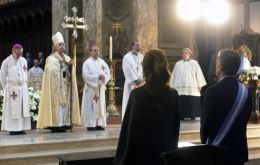
A sigh of relief from Argentine president Mauricio Macri and his administration following on Friday's Tedeum by the Archbishop of Buenos Aires, which marks the Church' message on May 25, the symbolic celebration of the first independence efforts during the 1810 Revolution.
-
Saturday, May 26th 2018 - 08:32 UTC
Thousands march in Buenos Aires to protest Argentina's IMF credit bid

Thousands of Argentines on Friday protested the government’s bid to secure a credit line from the International Monetary Fund, which they blame for hardship during a past financial crisis. Opposition parties, unions, human rights organizations and artists took part in the march near the capital Buenos Aires’ emblematic obelisk, under the banner “the country is in danger.”
-
Wednesday, May 23rd 2018 - 06:16 UTC
(Brexit) UK and Argentina on the same intelligent reinsertion to the global community
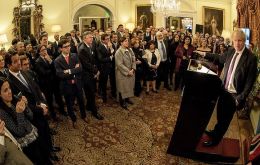
Foreign Secretary Boris Johnson forecasted a “new, exciting phase” in Anglo-Argentine relations as he wrapped up his visit to Buenos Aires. Johnson visited Argentina to attend the G20 Foreign Ministers summit. His visit was the first by a British Foreign Secretary in over 20 years.
-
Saturday, May 19th 2018 - 06:26 UTC
Boris Johnson will be the first Foreign Secretary to visit Argentina in 15 years
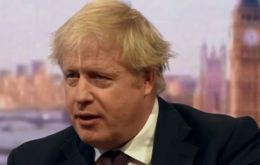
Boris Johnson is to make the first visit by a British foreign secretary to Argentina for 25 years. Mr. Johnson will seek to take advantage of the improvement in relations with Buenos Aires since President Mauricio Macri came to power in 2015.President Macri has talked of lifting curbs on oil, fishing and shipping around the Falkland Islands as tensions eased.
-
Friday, May 18th 2018 - 07:49 UTC
IMF confirms support for Macri, but also with greater focus on social protection
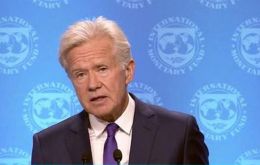
The International Monetary Fund will move quickly to agree on a loan program to support Argentina but there are no details yet on what it will entail, a fund spokesman said on Thursday. However spokesperson Gerry Rice also underlined that the IMF nowadays has a greater focus on social protection, in particular towards the most vulnerable, ensuring the economy and living standards.
-
Thursday, May 17th 2018 - 09:10 UTC
The dollar falls in Argentina while in Uruguay the rise “does not worry”
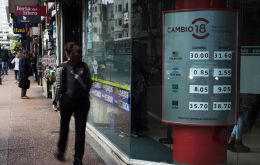
The recent rise of the dollar in Argentina had some impact in Uruguay, where it has an accumulation of 7.4% in May. However, for the president of the Central Bank of Uruguay, Mario Bergara, the escalation only owes 20% to the exchange rate in Argentina and rather considers that Uruguay is accompanying global trends.
-
Wednesday, May 16th 2018 - 09:09 UTC
Argentina seems to have managed Tuesday's challenge, but what comes next?

Argentina’s central bank on Tuesday rolled over billions of dollars in short-term debt, providing President Mauricio Macri’s government with a shot of confidence after weeks of economic volatility. In a statement, the Argentine central bank said it refinanced all of the US$ 26 billion of peso-denominated short term bonds that matured on Tuesday. Investors were attracted by renewal rates of 40% for 36-day Lebac and 38% and 38,5% for 90 days and plus, Lebacs.
